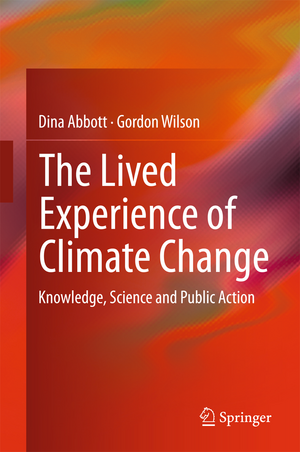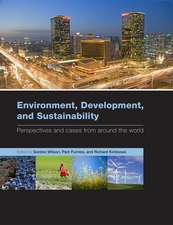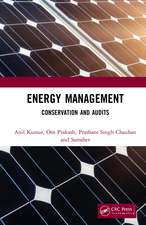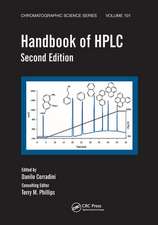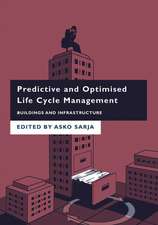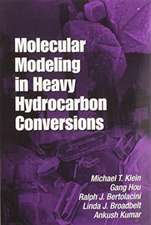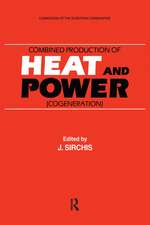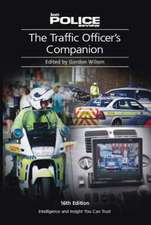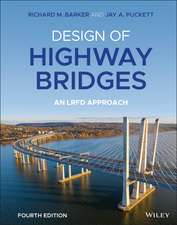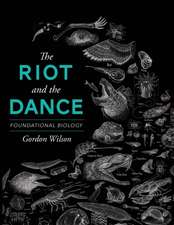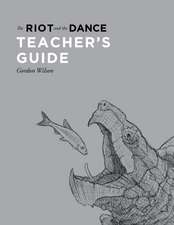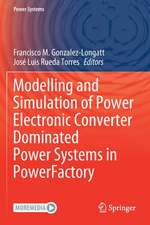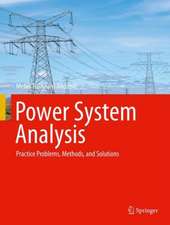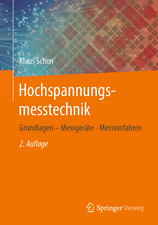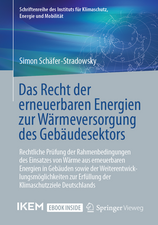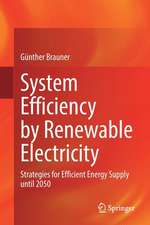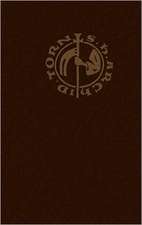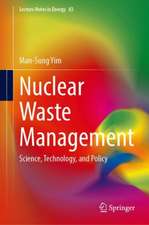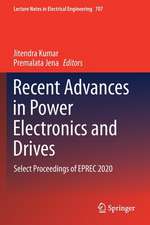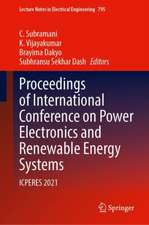The Lived Experience of Climate Change: Knowledge, Science and Public Action
Autor Dina Abbott, Gordon Wilsonen Limba Engleză Hardback – 8 mai 2015
Complemented by a rich collection of examples and case studies, this book proposes a novel way of generating and analysing knowledge about climate change and how it may be used. The reader is introduced to new insights where the book:
• Provides a framework that explains the variety of simultaneous, co-existing and often contradictory perspectives on climate change.
• Reclaims everyday experiential knowledge as crucial for meeting global challenges such as climate change.
• Overcomes the science-citizen dichotomy and leads to new ways of examining public engagement with science. Scientists are also human beings with lived experiences that filter their scientific findings into knowledge and actions.
• Develops a ‘public action theory of knowledge’ as a tool for exploring how decisions on climate policy and intervention are reached and enacted.
While scientists (physical and social) seek to explain climate change and its impacts, millions of people throughout the world experience it personally in their daily lives. The experience might be bad, as during extreme weather, engender hostility when governments attempt mitigation, and sometimes it is benign. This book seeks to understand the complex, often contradictory knowledge dynamics that inform the climate change debate, and is written clearly for a broad audience including lecturers, students, practitioners and activists, indeed anyone who wishes to gain further insight into this far-reachingissue.
| Toate formatele și edițiile | Preț | Express |
|---|---|---|
| Paperback (1) | 639.59 lei 6-8 săpt. | |
| Springer International Publishing – 9 oct 2016 | 639.59 lei 6-8 săpt. | |
| Hardback (1) | 645.79 lei 6-8 săpt. | |
| Springer International Publishing – 8 mai 2015 | 645.79 lei 6-8 săpt. |
Preț: 645.79 lei
Preț vechi: 759.76 lei
-15% Nou
Puncte Express: 969
Preț estimativ în valută:
123.57€ • 129.36$ • 102.25£
123.57€ • 129.36$ • 102.25£
Carte tipărită la comandă
Livrare economică 05-19 aprilie
Preluare comenzi: 021 569.72.76
Specificații
ISBN-13: 9783319179445
ISBN-10: 3319179446
Pagini: 268
Ilustrații: X, 268 p. 13 illus., 11 illus. in color.
Dimensiuni: 155 x 235 x 20 mm
Greutate: 0.57 kg
Ediția:2015
Editura: Springer International Publishing
Colecția Springer
Locul publicării:Cham, Switzerland
ISBN-10: 3319179446
Pagini: 268
Ilustrații: X, 268 p. 13 illus., 11 illus. in color.
Dimensiuni: 155 x 235 x 20 mm
Greutate: 0.57 kg
Ediția:2015
Editura: Springer International Publishing
Colecția Springer
Locul publicării:Cham, Switzerland
Public țintă
ResearchCuprins
Introduction: A wealth of lived experience.- Exploring the lived experience of climate change.- Lived experience and scientific knowledge of climate change.- Representing climate change: science, social science, interdisciplinary approaches and lived experience.- Lived experience and advocates of local knowledge.- Lived experience and discourses of mitigation, adaptation.- Lived experience and engagement on climate change.- Lived experience, science and a social imagination.- Rationalist and public action theories of knowledge in climate change debates.- Institutionalising lived experience in the public policy process.- A public action approach to knowledge and intervention to meet the climate challenge.
Notă biografică
Dina Abbott is full Professor of Development Geography at the University of Derby. She is an active researcher who has published extensively in journals and books. Her research expertise is on gendered urban and rural poverty, including the impact of climate change, and she has worked in India, the Gambia, Senegal, Morocco and East Africa. Her special interest also extends to the methodological, philosophical and ethical implications of research. She was most recently a major contributor to the interdisciplinary European Union Erasmus project, ‘The lived experience of climate change’ where she worked closely with Gordon Wilson. Her personal contribution to this project was to create on-line Masters teaching modules on sociological approaches to the subject and interdisciplinary methodologies for investigation into the ‘lived experiences’ of climate change. She was also co-editor of a journal special issue arising from that project and is an editorial board member of online African Journal of Environmental Science and Technology.
Gordon Wilson was until his retirement in December 2011 full Professor of Environment and Development, and is now Emeritus Professor, at the Open University. He retains an active research interest in social learning and its potential to generate knowledge with respect to environmental issues in a development context. He has published extensively on the topic, including a Reader where he was the major editor and a book (co-authored with a colleague). He led the interdisciplinary European Union Erasmus project, ‘The lived experience of climate change’, where he pioneered the intellectual development of the concept through on-line Masters teaching modules, and as co-editor (with Dina Abbott) of a journal special issue.
Gordon Wilson was until his retirement in December 2011 full Professor of Environment and Development, and is now Emeritus Professor, at the Open University. He retains an active research interest in social learning and its potential to generate knowledge with respect to environmental issues in a development context. He has published extensively on the topic, including a Reader where he was the major editor and a book (co-authored with a colleague). He led the interdisciplinary European Union Erasmus project, ‘The lived experience of climate change’, where he pioneered the intellectual development of the concept through on-line Masters teaching modules, and as co-editor (with Dina Abbott) of a journal special issue.
Textul de pe ultima copertă
This book explores the idea that daily lived experiences of climate change are a crucial missing link in our knowledge that contrasts with scientific understandings of this global problem. It argues that both kinds of knowledge are limiting: the sciences by their disciplines and lived experiences by the boundaries of everyday lives. Therefore each group needs to engage the other in order to enrich and expand understanding of climate change and what to do about it.
Complemented by a rich collection of examples and case studies, this book proposes a novel way of generating and analysing knowledge about climate change and how it may be used. The reader is introduced to new insights where the book:
• Provides a framework that explains the variety of simultaneous, co-existing and often contradictory perspectives on climate change.
• Reclaims everyday experiential knowledge as crucial for meeting global challenges such as climate change.
• Overcomes the science-citizen dichotomy and leads to new ways of examining public engagement with science. Scientists are also human beings with lived experiences that filter their scientific findings into knowledge and actions.
• Develops a ‘public action theory of knowledge’ as a tool for exploring how decisions on climate policy and intervention are reached and enacted.
While scientists (physical and social) seek to explain climate change and its impacts, millions of people throughout the world experience it personally in their daily lives. The experience might be bad, as during extreme weather, engender hostility when governments attempt mitigation, and sometimes it is benign. This book seeks to understand the complex, often contradictory knowledge dynamics that inform the climate change debate, and is written clearly for a broad audience including lecturers, students, practitioners and activists, indeed anyone who wishes to gain further insight into this far-reachingissue.
Complemented by a rich collection of examples and case studies, this book proposes a novel way of generating and analysing knowledge about climate change and how it may be used. The reader is introduced to new insights where the book:
• Provides a framework that explains the variety of simultaneous, co-existing and often contradictory perspectives on climate change.
• Reclaims everyday experiential knowledge as crucial for meeting global challenges such as climate change.
• Overcomes the science-citizen dichotomy and leads to new ways of examining public engagement with science. Scientists are also human beings with lived experiences that filter their scientific findings into knowledge and actions.
• Develops a ‘public action theory of knowledge’ as a tool for exploring how decisions on climate policy and intervention are reached and enacted.
While scientists (physical and social) seek to explain climate change and its impacts, millions of people throughout the world experience it personally in their daily lives. The experience might be bad, as during extreme weather, engender hostility when governments attempt mitigation, and sometimes it is benign. This book seeks to understand the complex, often contradictory knowledge dynamics that inform the climate change debate, and is written clearly for a broad audience including lecturers, students, practitioners and activists, indeed anyone who wishes to gain further insight into this far-reachingissue.
Caracteristici
Explores the idea that the lived experience of climate change is central to the challenge of solving this global problem Represents a new, comprehensive and powerful lens on climate change that sets it apart from other previously published titles Develops the term ‘public action theory of knowledge’ as a powerful analytical tool for exploring how decisions on intervention are reached and enacted Includes supplementary material: sn.pub/extras
